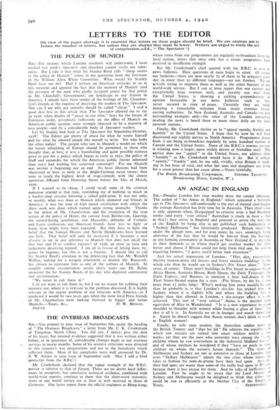LETTERS TO THE EDITOR
In view of the paper shortage it is essential that letters on these pages should be brief. We are anxious not to reduce the number of letters, but unless they are shorter they must be fewer. Writers are urged to study the art of compression.—Ed., 4. The Spectator "]
THE POLICY OF MUNICH
Sie,—For reasons which London residents will understand, I have mislaid last week's Spectator and therefore cannot verify my refer- ences. But I take it that what Sir Stanley Reed calls " cheap sneers at the policy of Munich " refers to my quotation from the literature of the William Allen White Committee. What would Sir Stanley Reed have me do? Had I written on American attitudes to us at this moment and ignored the fact that the memory of Munich (and the presence of the -men who gladly accepted praise for that policy in Mr. Churchill's Government) are handicaps to our friends in America, I should have been tender of the feelings of Mr. Chamber- lain's friends at the expense of deceiving the readers of The Spectator. Nor can I see why my remarks should be called " cheap." I said a good deal less in this article than The Spectator allowed me to say in 1938, when doubts of " peace in our time," fears for the future of European order, pessimistic reflections on the effect of Munich on American public opinion, were strongly objected to by a majority of nice people—and by a considerable body of Spectator readers. Let Sir Stanley look back at The Spectator for September-October, 5938! The Editor got plenty of abuse for what he wrote himself and for what he allowed people like myself to write. Yet who looks the sillier today? The people who saw in Munich a model on which the future rebuilding of Europe should be patterned, or those who thought that, at best, it was a humiliating and quite possibly ruinous price to pay for a policy which began as early as 5935, the policy of bluff and surrender for which the American public (better informed than ours) had nothing but surprised contempt? For me Munich was neither a beginning nor an end. Its basic illusions had been illustrated at least as early as the Anglo-German naval treaty; they were to reach the highest level of tragi-comedy with the cheery optimism diffused from Downing Street before the Ides of March,
1939.
If I wanted to be cheap, I could recall some of the criminal nonsense uttered at that time, reminding me of nothing so much as a bucket-shop circular boosting a salted gold-mine. It was not only, or mainly, what was done at Munich which alienated our friends in America; it was the tone of high moral satisfaction with which the dirty work was done which turned quite strong stomachs. Thanks to the defeat of Mr. Chamberlain and the revelation of the true nature of the policy of Hitler, the saviour from Bolshevism, Goering, the animal-loving gentleman, and Mussolini, defender of Catholic and Latin civilisation, our American friends have less to fight at home than might have been expected. But they have to fight the belief that 'the Samuel Hoares and Nevile Hendersons have learned too little. That belief will only be increased if it becomes a mot d'ordre to see in any reference to Munich that does not recall the first fine and 0 so careless rapture! of 1938, an error in taste and judgement deserving reproof. I am all in favour of letting mere by- gones be bygones, but this is not a bygone. I should like to call Sir Stanley Reed's attention to the interesting fact that Mr. Wendell Willkie, seeking for a weapon wherewith to destroy Mr. Roosevelt, has chosen to represent him as one of the authors of Munich. In roughly similar circumstances nearly thirty years ago Mr. Belloc answered the Sir Stanley Reeds of his day who deplored controversy and recrimination:
" We mean to rub them in."
I do not want to rub them in, but I see no reason for rubbing their memory out, where it is relevant to the problem discussed. It is highly relevant to the urgent problem of our relations with America—as I predicted it would be two years ago, when the most loyal Press friends of Mr. Chamberlain were looking forward to bigger and better


























 Previous page
Previous page